Supporting Details
Supporting details give you specific details about the main idea of the text. A supporting detail SUPPORTS and DEVELOPS the text’s main idea. Read More...
◂English Language Arts Worksheets and Study Guides Sixth Grade. Supporting Details
Study Guide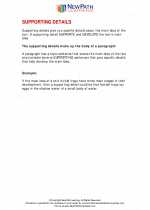 Supporting Details
Supporting Details  Worksheet/Answer key
Worksheet/Answer key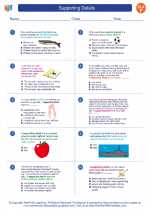 Supporting Details
Supporting Details  Worksheet/Answer key
Worksheet/Answer key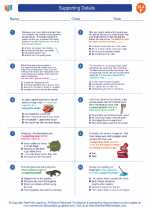 Supporting Details
Supporting Details  Worksheet/Answer key
Worksheet/Answer key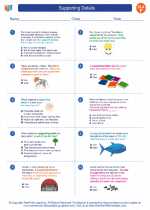 Supporting Details
Supporting Details  Worksheet/Answer key
Worksheet/Answer key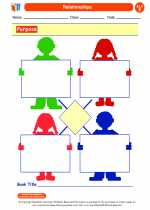 Relationships
Relationships 

 Worksheet/Answer key
Worksheet/Answer key
 Worksheet/Answer key
Worksheet/Answer key
 Worksheet/Answer key
Worksheet/Answer key
 Worksheet/Answer key
Worksheet/Answer key

The resources above cover the following skills:
Reading Standards for Literature
Key Ideas and Details
Cite textual evidence to support analysis of what the text says explicitly as well as inferences drawn from the text. [RL.6.1]
Describe how a particular story’s or drama’s plot unfolds in a series of episodes as well as how the characters respond or change as the plot moves toward a resolution. [RL.6.3]
Reading Standards for Informational Text
Key Ideas and Details
Cite textual evidence to support analysis of what the text says explicitly as well as inferences drawn from the text. [RI.6.1]
Determine a central idea of a text and how it is conveyed through particular details; provide a summary of the text distinct from personal opinions or judgments. [RI.6.2]
Analyze in detail how a key individual, event, or idea is introduced, illustrated, and elaborated in a text (e.g., through examples or anecdotes). [RI.6.3]
Integration of Knowledge and Ideas
Trace and evaluate the argument and specific claims in a text, distinguishing claims that are supported by reasons and evidence from claims that are not. [RI.6.8]
Writing Standards
Research to Build and Present Knowledge
Draw evidence from literary or informational texts to support analysis, reflection, and research. [W.6.9]
Apply Grade 6 Reading standards to literary nonfiction (e.g., “Trace and evaluate the argument and specific claims in a text, distinguishing claims that are supported by reasons and evidence from claims that are not”). [W.6.9b]